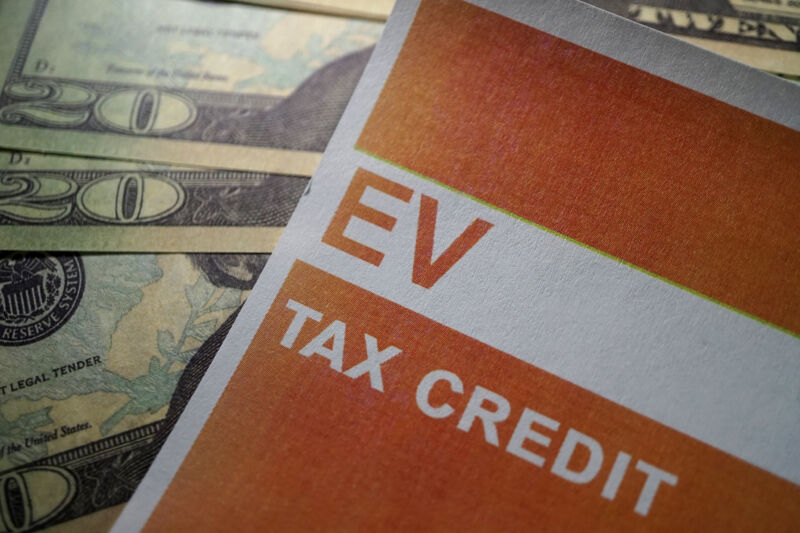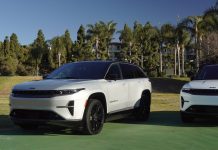Strict rules about battery components from China make most plug-ins ineligible.

It’s a new year, and while few of us still have the headache of needing to remember to write the new year on checks, 2024 brings a new annoyance of sorts. As of yesterday, tough new US Treasury Department rules concerning the sourcing of electric vehicle batteries went into effect; as a result, most of the battery and plug-in hybrid EVs that were eligible for the Internal Revenue Service’s clean vehicle tax credit until Sunday have now lost that eligibility.
Under the federal government’s previous program to incentivize the adoption of plug-in vehicles, it offered a tax credit up to $7,500 based on the battery capacity of a BEV or PHEV. Once a car maker sold more than 200,000 plug-in vehicles, it lost eligibility for the tax credit—only Tesla and General Motors reached this threshold.
Changes came as part of the Inflation Reduction Act of 2022 and went into effect at the start of 2023. Thanks to heavy industry lobbying, credits linked to union-made EVs went by the wayside, with US Senator Joe Manchin acting as the point man for companies like Toyota that sought to slow down the EV transition.
As we’ve detailed in the past, the new rules allow for a tax credit of up to $7,500 for the purchase of a new EV. But there are plenty of conditions. The final assembly must take place in North America. There are income caps for the buyer and a price cap for the vehicle—no more than $55,000 for a sedan or $80,000 for an SUV, truck, or minivan. Half of the tax credit is tied to a certain amount of domestically refined or processed minerals in the battery pack, the other half to a certain value of the pack having been assembled domestically.
While that includes countries that have free trade agreements with the United States, it significantly limited the number of new EVs that were eligible for the tax credit. (However, the IRS chose to read the law in such a way as to still allow the full $7,500 tax credit for clean vehicles that were leased, even if not assembled in North America.)Advertisement
The list of eligible cars changed throughout the year as the rules were implemented in stages, and as automakers refined their supply chains as required. But toward the end of 2023, the Treasury published another new guideline. Now, any car with a battery that contains material from or made by a “foreign entity of concern”—which means Russia, Iran, North Korea, or China—cannot be eligible for the tax credit.
While the first three nations on that list are not particularly far down the road of EV battery making, the same isn’t true for China, which dominates the field, particularly in terms of processing the critical minerals used in lithium-ion batteries. The FEOC rule also applies to batteries made by Chinese-owned companies, even if the cells are produced in the US.
Consequently, the list of BEVs and PHEVs that are still eligible for the new clean vehicle tax credit now looks rather meager. The following clean vehicles still qualify for the full $7,500, although we should note that the first two on the list (the Chevrolet Bolts) have ceased production now:
- 2022-2023 Chevrolet Bolt EV
- 2022-2023 Chevrolet Bolt EUV
- 2022-2024 Chrysler Pacifica PHEV
- 2022-2024 Ford F-150 Lightning extended range battery
- 2022-2024 Ford F-150 Lightning standard range battery
- 2023-2024 Tesla Model 3 Performance
- 2023-2024 Tesla Model X Long Range
- 2023-2024 Tesla Model Y All-Wheel Drive
- 2023-2024 Tesla Model Y Performance
- 2023-2024 Tesla Model Y Rear-Wheel Drive
Additionally, the following vehicles qualify for a $3,750 tax credit:
- 2022-2024 Ford Escape Plug-In Hybrid
- 2022-2024 Jeep Grand Cherokee PHEV 4xe
- 2022-2024 Jeep Wrangler PHEV 4xe
- 2022-2024 Lincoln Corsair Grand Touring
- 2023-2024 Rivian R1S Dual Large
- 2023-2024 Rivian R1S Quad Large
- 2023-2024 Rivian R1T Dual Large
- 2023-2024 Rivian R1T Dual Max
- 2023-2024 Rivian R1T Quad Large
But there is one bright piece of news concerning the clean vehicle tax credit in 2024. From January 1, dealers are now able to pass the entire credit on to the buyer at the point of purchase. This applies to both new and used EVs, even in cases where the buyer may not have a large enough tax liability at the end of the year to claim the full credit the old-fashioned way.




